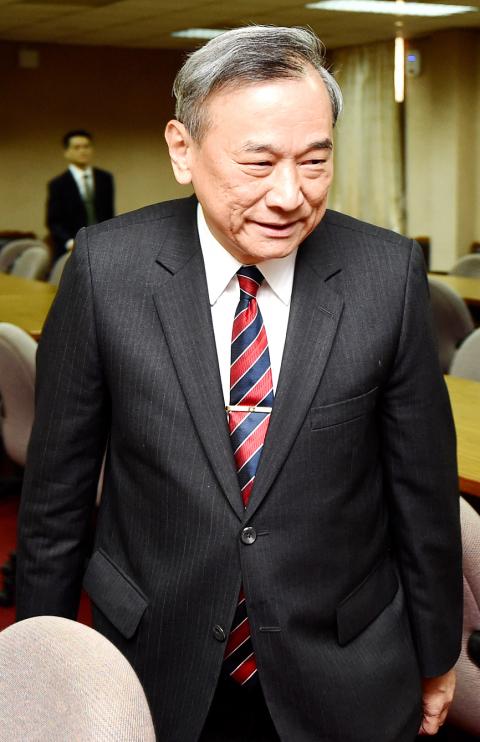Following more than a decade of legislative proposals, the Cabinet yesterday approved a draft law on nonprofit foundations to place government-funded foundations under strict supervision and prevent them from misappropriating national assets.
The draft act divides foundations into two categories — private and government-funded — each with their own regulatory criteria, Deputy Minister of Justice Chen Ming-tang (陳明堂) said.
Stricter regulations are to be imposed on government-sponsored foundations, such as the Chiang Ching-kuo Foundation for International Scholarly Exchange, and those funded with public properties taken over from the Japanese colonial government, including the Taiwan Telecommunication Industry Development Association, the Postal Association and the Taiwan Sugar Association, which control billions of New Taiwan dollars in assets, but operate outside government control.

Photo: Chien Jung-fong, Taipei Times
Foundations are to be required to disclose their financial and operational data, as well as establish accounting and auditing systems, and would be subject to financial penalties if they fail to comply with government inspections or supervision.
The draft act authorizes the government to merge or dissolve foundations that can no longer meet their founding purpose, with property to be returned to the state.
The bill stipulates that a certain number of board members of government-funded foundations would have to be appointed by the government, with the number to be decided by the state’s stake in an organization’s assets.
Under the proposed act, in a bid to eliminate “fat cats,” government-appointed positions are to generally be unpaid, while holders of salaried positions would be required to give up any pension benefits while in office.
More lenient criteria would be applied to private foundations to ensure their autonomy, Chen said.
There are 165 government-sponsored foundations, 43 of which receive less than 50 percent of their funding from the state, while there are more than 600 private foundations.
“Nonprofit foundations are often criticized as being tools for tax evasion. The existing legal framework is not quite sufficient for regulation, so the draft act was proposed to ensure government supervision,” Chen said.
Transparency in the financial and personnel management of nonprofit organizations is key to ensuring their proper operation, but many organizations have shed government control, Premier Lin Chuan (林全) said.
“The draft act is progressive and will improve the legal environment of nonprofit foundations and their operations,” Lin said.
At present there are no regulations governing nonprofit foundations except for a set of general provisions in the Civil Code.
In September 2000, the Ministry of Justice began drafting legislation to regulate nonprofit foundations, with the Executive Yuan submitting four drafts since 2007 to the Legislative Yuan, none of which passed.
The Ministry of the Interior is to draft a special bill on religious and medical foundations, which have considerable real-estate holdings and are often criticized for a lack of financial transparency.

Tropical Storm Gaemi strengthened into a typhoon at 2pm yesterday, and could make landfall in Yilan County tomorrow, the Central Weather Administration (CWA) said yesterday. The agency was scheduled to issue a sea warning at 11:30pm yesterday, and could issue a land warning later today. Gaemi was moving north-northwest at 4kph, carrying maximum sustained winds near its center of up to 118.8kph and gusts of 154.8kph. The circumference is forecast to reach eastern Taiwan tomorrow morning, with the center making landfall in Yilan County later that night before departing from the north coast, CWA weather forecaster Kuan Shin-ping (官欣平) said yesterday. Uncertainty remains and

SEA WARNING LIKELY: The storm, named Gaemi, could become a moderate typhoon on Wednesday or Thursday, with the Taipei City Government preparing for flooding A tropical depression east of the Philippines developed into a tropical storm named Gaemi at 2pm yesterday, and was moving toward eastern Taiwan, the Central Weather Administration (CWA) said. Gaemi could begin to affect Taiwan proper on Tuesday, lasting until Friday, and could develop into a moderate typhoon on Wednesday or Thursday, it said. A sea warning for Gaemi could be issued as early as Tuesday morning, it added. Gaemi, the third tropical storm in the Pacific Ocean this typhoon season, is projected to begin moving northwest today, and be closest to Taiwan on Wednesday or Thursday, the agency said. Today, there would likely

DISRUPTIONS: The high-speed rail is to operate as normal, while several airlines either canceled flights or announced early departures or late arrivals Schools and offices in 15 cities and counties are to be closed today due to Typhoon Gaemi, local governments announced last night. The 15 are: Taipei, New Taipei City, Taoyuan, Tainan, Keelung, Hsinchu and Kaohsiung, as well as Yilan, Hualien, Hsinchu, Miaoli, Chiayi, Pingtung, Penghu and Lienchiang counties. People should brace for torrential rainfall brought by the storm, with its center forecast to make landfall on the east coast between tonight and tomorrow morning, the Central Weather Administration (CWA) said. The agency issued a sea warning for the typhoon at 11:30pm on Monday, followed by a land warning at 11:30am yesterday. As of

CASUALTY: A 70-year-old woman was killed by a falling tree in Kaohsiung as the premier warned all government agencies to remain on high alert for the next 24 hours Schools and offices nationwide are to be closed for a second day today as Typhoon Gaemi crosses over the nation, bringing torrential rain and whipping winds. Gaemi was forecast to make landfall late last night. From Tuesday night, its outer band brought substantial rainfall and strong winds to the nation. As of 6:15pm last night, the typhoon’s center was 20km southeast of Hualien County, Central Weather Administration (CWA) data showed. It was moving at 19kph and had a radius of 250km. As of 3pm yesterday, one woman had died, while 58 people were injured, the Central Emergency Operation Center said. The 70-year-old